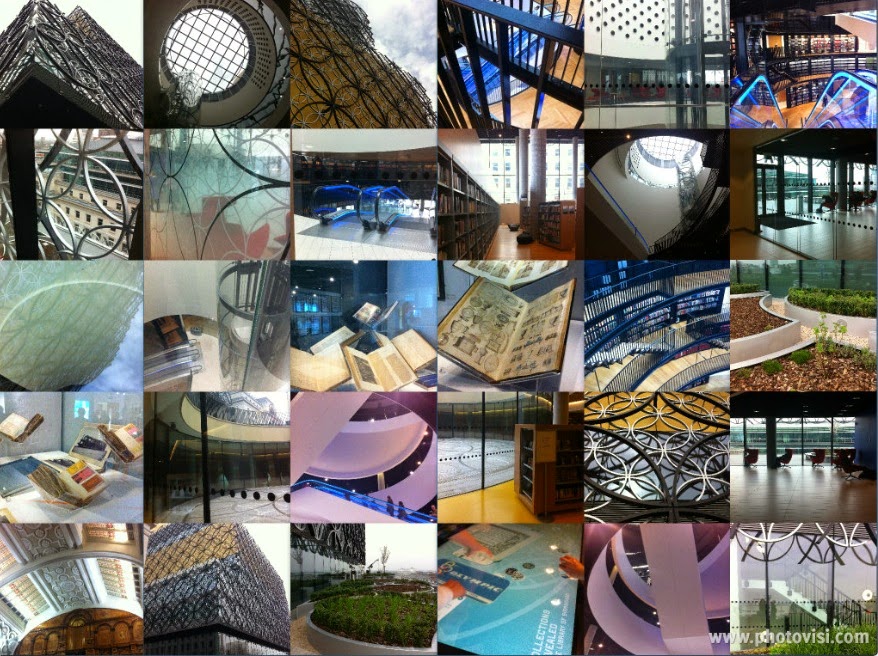I
arrived early, so by the time we all assembled in the Foyer for the guided tour
organised by CILIP SW I had already spent a couple of hours mooching about -
sitting in a comfy retro-looking red chair, reading; enjoying lunch in the
ground floor café; and generally soaking up the atmosphere of this imposing building
in the heart of Birmingham. I was there I thought with my Librarian ‘hat’ on,
imagining that I would be professionally enthused by the resources on offer…which
I was. However, the minute I entered this amazing space books took a back seat to
the environment they were contained within. Having originally trained as a
designer my creative brain took over and I was captivated by the juxtaposition
of shape, colour and texture that make up this amazing public space. It was
about the resources as well obviously, the building wouldn’t be there without
them, but the Library of Birmingham serves as so much more than a repository
for the printed or even digitised word, as befits a 21st Century
knowledge space. From the painstakingly relocated Shakespeare Memorial Room within
the Skyline Viewpoint on Level 9, to the contemporary Beatbox
adjacent to the glass walled Amphitheatre in the basement, this unique building
offers its visitors an experience beyond the confines of a traditional Library.
As I wandered around it was obvious to me how inclusive the space has been
designed to be. Toddlers romped on the vast, cushion covered steps of the Children’s
Library; students were engrossed in study on most floors; people relaxed with
or without books; tourists took in the huge views of the city from the
Discovery Terrace; an elderly gentleman played faltering notes on a piano in
the Music Library. But overwhelmingly I had the sense that a lot of the visitors
were there purely to soak up the vibrant mood of the place. No stereotypical
ssshing by Library Staff was to be heard here!
I
took minimal notes for this piece (which is patently obvious!) despite the fact
that Keri our Guide was interesting, articulate and knowledgeable. I spent most
of my time on the tour at the back of the Group, taking copious photos. So
apart from the few facts that I gleaned when I was actually listening, and a
glance at the Visitor Guide (available on the website here http://www.libraryofbirmingham.com/ ), most of my recollections of this visit are visual. The
montage below will hopefully give an idea of the space through my eyes, and
here is a link to more of the images I took if you are interested https://www.flickr.com/photos/angie2501/sets/72157643325013855/...with apologies for the quality as they were taken on
my iPhone. I’d encourage everyone to visit if they can as for me the Library
transcended expectations, proving to be one of the most wonderful buildings I’ve
spent time in, from both a design and hopefully (for the 200 or so staff who
work in it) functional point of view. Time will tell I suppose. But I do understand
that it’s probably a bit like Marmite!
Some facts...with fingers crossed that they are accurate!
· Built for £188m, the building in part pays this investment back with the latest low impact, low carbon technology, natural air ventilation and water conservation systems, and an emphasis on recycling.
· The ‘Golden Box’ forming the middle section of the building is inaccessible to the public and houses the Library Archives on these two, secure and environmentally controlled floors.
· Staff can only work for 30 minutes at a time in certain areas of the Golden Box due to the oxygen reduced conditions which help to limit fire risk.
· “Flying books” and Audubon’s Birds of America form some of the current glass-housed displays in the dimly lit and atmospheric exhibition space on the 3rd floor.
· Both of the gardens, accessible to all visitors, have been planted with fruit and vegetables as well as flowering plants to encourage interest in ‘grow your own’
· A Falconer and her Peregrine regularly visit to ‘dissuade’ pigeons from roosting on the building, and the decorative cladding has been designed to limit nesting too.
· The first book to be shelved in the Library was Tolkien’s The Hobbit.
